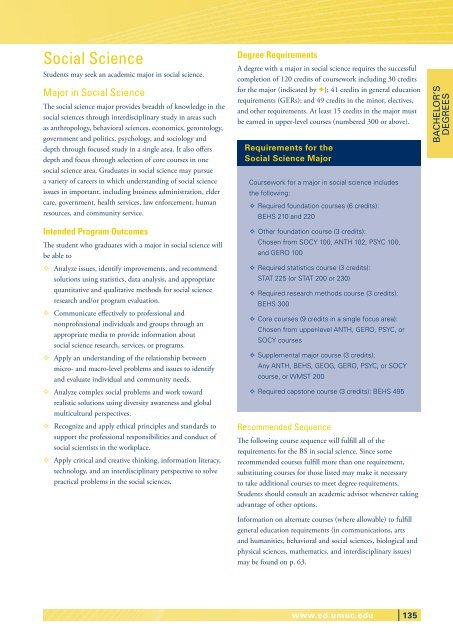Undergraduate Catalog - UMUC Europe
Undergraduate Catalog - UMUC Europe
Undergraduate Catalog - UMUC Europe
You also want an ePaper? Increase the reach of your titles
YUMPU automatically turns print PDFs into web optimized ePapers that Google loves.
Social Science<br />
Students may seek an academic major in social science.<br />
Major in Social Science<br />
The social science major provides breadth of knowledge in the<br />
social sciences through interdisciplinary study in areas such<br />
as anthropology, behavioral sciences, economics, gerontology,<br />
government and politics, psychology, and sociology and<br />
depth through focused study in a single area. It also offers<br />
depth and focus through selection of core courses in one<br />
social science area. Graduates in social science may pursue<br />
a variety of careers in which understanding of social science<br />
issues in important, including business administration, elder<br />
care, government, health services, law enforcement, human<br />
resources, and community service.<br />
Intended Program Outcomes<br />
The student who graduates with a major in social science will<br />
be able to<br />
G Analyze issues, identify improvements, and recommend<br />
solutions using statistics, data analysis, and appropriate<br />
quantitative and qualitative methods for social science<br />
research and/or program evaluation.<br />
G Communicate effectively to professional and<br />
nonprofessional individuals and groups through an<br />
appropriate media to provide information about<br />
social science research, services, or programs.<br />
G Apply an understanding of the relationship between<br />
micro- and macro-level problems and issues to identify<br />
and evaluate individual and community needs.<br />
G Analyze complex social problems and work toward<br />
realistic solutions using diversity awareness and global<br />
multicultural perspectives.<br />
G Recognize and apply ethical principles and standards to<br />
support the professional responsibilities and conduct of<br />
social scientists in the workplace.<br />
G Apply critical and creative thinking, information literacy,<br />
technology, and an interdisciplinary perspective to solve<br />
practical problems in the social sciences.<br />
Degree Requirements<br />
A degree with a major in social science requires the successful<br />
completion of 120 credits of coursework including 30 credits<br />
for the major (indicated by F); 41 credits in general education<br />
requirements (GERs); and 49 credits in the minor, electives,<br />
and other requirements. At least 15 credits in the major must<br />
be earned in upper-level courses (numbered 300 or above).<br />
Requirements for the<br />
Social Science Major<br />
Coursework for a major in social science includes<br />
the following:<br />
G Required foundation courses (6 credits):<br />
BEHS 210 and 220<br />
G Other foundation course (3 credits):<br />
Chosen from SOCY 100, ANTH 102, PSYC 100,<br />
and GERO 100<br />
G Required statistics course (3 credits):<br />
STAT 225 (or STAT 200 or 230)<br />
G Required research methods course (3 credits):<br />
BEHS 300<br />
G Core courses (9 credits in a single focus area):<br />
Chosen from upper-level ANTH, GERO, PSYC, or<br />
SOCY courses<br />
G Supplemental major course (3 credits):<br />
Any ANTH, BEHS, GEOG, GERO, PSYC, or SOCY<br />
course, or WMST 200<br />
G Required capstone course (3 credits): BEHS 495<br />
Recommended Sequence<br />
The following course sequence will fulfill all of the<br />
requirements for the BS in social science. Since some<br />
recommended courses fulfill more than one requirement,<br />
substituting courses for those listed may make it necessary<br />
to take additional courses to meet degree requirements.<br />
Students should consult an academic advisor whenever taking<br />
advantage of other options.<br />
Information on alternate courses (where allowable) to fulfill<br />
general education requirements (in communications, arts<br />
and humanities, behavioral and social sciences, biological and<br />
physical sciences, mathematics, and interdisciplinary issues)<br />
may be found on p. 63.<br />
www.ed.umuc.edu 135<br />
BACHELOR’S<br />
DEGREES






